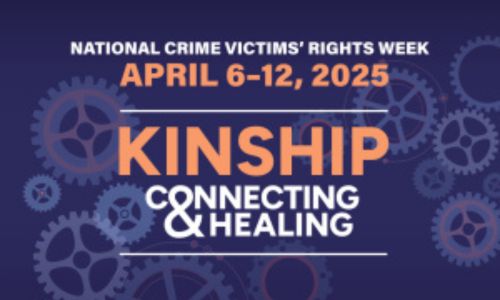MONTGOMERY, AL — Alabama Attorney General Steve Marshall is joining forces with law enforcement agencies and crime victims’ organizations across the state to recognize National Crime Victims’ Rights Week, observed this year from April 6–12, 2025. The annual observance serves as a time to honor those impacted by crime, support their families, and raise awareness about critical resources available to aid in their healing journey.
The 2025 theme, “Kinship, Connecting & Healing,” underscores the role of community in restoring hope and strength to victims and survivors. Across Alabama, communities are coming together in vigils and gatherings to reflect, remember, and support one another.
“I have seen firsthand the immense pain and challenges that victims of crime and their families face as they seek justice and begin the difficult process of healing,” said Attorney General Marshall. “It is often a long and painful journey—one that victims, law enforcement officers, prosecutors, and advocates walk together. This week is a time to recognize that journey, to stand in solidarity with those who have suffered, and to renew our commitment to ensuring they receive the support and swift justice they deserve.”
Throughout the week, the Attorney General’s Office will be present at events across the state, offering support and standing with survivors and their advocates. Marshall encouraged Alabamians to take part in local events and to reach out to those in need.
“This week, people around our great state gather and honor loved ones who have experienced unimaginable tragedies, coming together to connect and bring hope to each other,” Marshall said. “I encourage all Alabamians to take a moment to remember those affected by crime and to attend a vigil in their area. Too many victims of crime feel alone and isolated, unaware of the resources and support available to them. Our state stands ready to help, as no victim should ever feel forgotten.”
National Crime Victims’ Rights Week has been commemorated annually since 1981, promoting victims’ rights and services and acknowledging the strength and resilience of survivors.
To learn more about events happening during National Crime Victims’ Rights Week and available support services, visit https://ovc.ojp.gov/ncvrw2025/overview.
The Attorney General released an OpEd Piece today:
Standing with Victims: A Commitment That Endures Beyond a Single Week
By Alabama Attorney General Steve Marshall
Each April, our nation pauses to recognize those who have suffered the life-altering impacts of crime and to reaffirm our commitment to justice, healing, and support. National Crime Victims’ Rights Week, established by President Ronald Reagan in 1981, was born from a national cry for change, a cry that still echoes today.
This year’s theme, “Kinship, Connection & Healing,” is a powerful reminder of the human bonds that sustain victims in their darkest hours. It reflects the spirit of unity that defines how we serve survivors, not only through laws and legal processes, but through compassion, empathy, and enduring support. These three words—kinship, connection, and healing— represent a collective promise to walk alongside victims on their journey to justice.
For more than 20 years, first as a prosecutor and now as your Attorney General, I’ve seen firsthand the deep pain and loss that crime inflicts. I’ve also seen something else: the incredible resilience of victims and the unwavering strength of the families who stand by them. It is those individuals, survivors, and their loved ones, who fuel my work and that of the dedicated team in the Attorney General’s Office.
Our Victim Assistance Division exists to serve those impacted by violent crime. Last year, our team reviewed more than 1,400 cases to advocate for crime victims, made hundreds of notifications to keep victims informed of legal proceedings, formally protested over 2,200 parole and pardon requests to keep dangerous criminals off our streets, and continuously supported victims in courtrooms across Alabama. We work to ensure that no victim is left in the dark by sending critical notifications, helping families understand their rights, and connecting them to essential services.
Meanwhile, our Criminal Appeals Division handled more than 1,000 appeals with a 95% success rate in upholding convictions, and our Capital Litigation Division continues to ensure that those who commit the most heinous crimes are held fully accountable.
Still, even with legal victories, justice is often slow, and the needs of victims do not fade with time. That’s why we must continue to press for change.
One of the most important efforts underway this year is our work with the Alabama Legislature to pass the Speedy Trial Act. I have partnered with Senate Judiciary Chairman Will Barfoot and House Judiciary Chairman Jim Hill to sponsor this crucial legislation, which is designed to reduce court backlogs, streamline criminal proceedings, and ensure that violent offenders are brought to justice in a timely manner.
All too often, victims and their families are forced to wait months, or even years, before their day in court. Delays add emotional strain, hinder healing, and erode public confidence in our justice system. The Speedy Trial Act will make targeted reforms to prevent unnecessary delays and ensure that the rights of victims are treated with the same urgency and dignity as those of the accused.
This bill sends a powerful message: in Alabama, we will not tolerate a system that allows violent criminals to linger in legal limbo while victims wait for answers. Justice delayed is justice denied and this legislation is a critical step toward restoring balance and fairness in our courts.
But laws alone aren’t enough. We must also foster a culture that puts victims first. That’s why our office partners with outstanding local organizations like Victims of Crime and Leniency (VOCAL), Domestic Violence Service Providers, Sexual Assault Service Providers, and Children’s Advocacy Centers. These groups are on the front lines by offering comfort, guidance, and resources to families when they need them most.
The road to healing is long, but those who walk it should never have to walk alone. Whether it’s a police officer answering a midnight call, a prosecutor preparing for trial, or a counselor helping someone find their voice again, we are all part of a vital mission: to restore hope where it’s been broken.
As Attorney General, I pledge that our commitment to victims is not limited to a single week in April. It’s a promise we keep every day. To every survivor and every family still seeking justice, know this:
You are seen. You are heard. And you are not alone.












